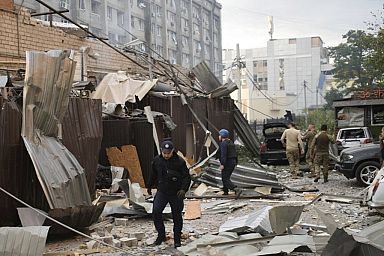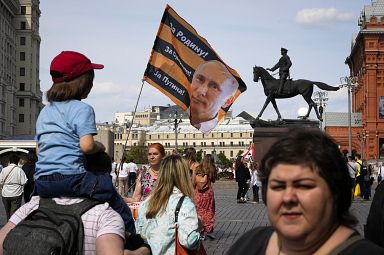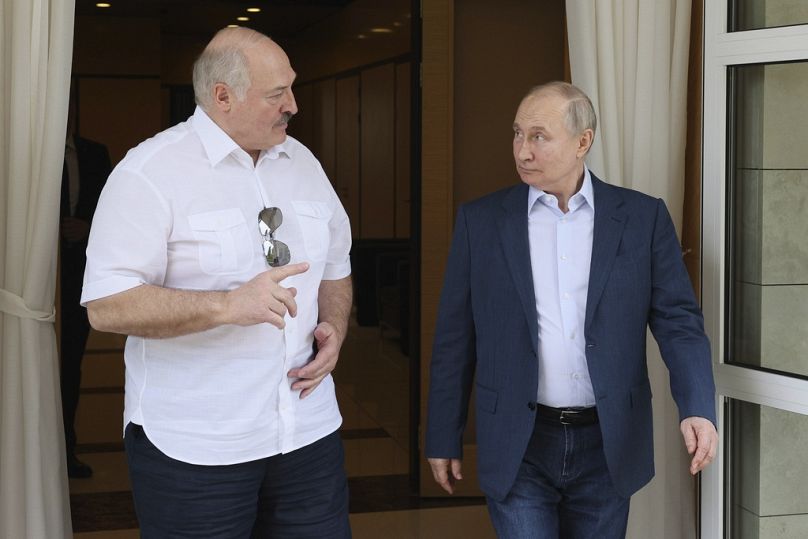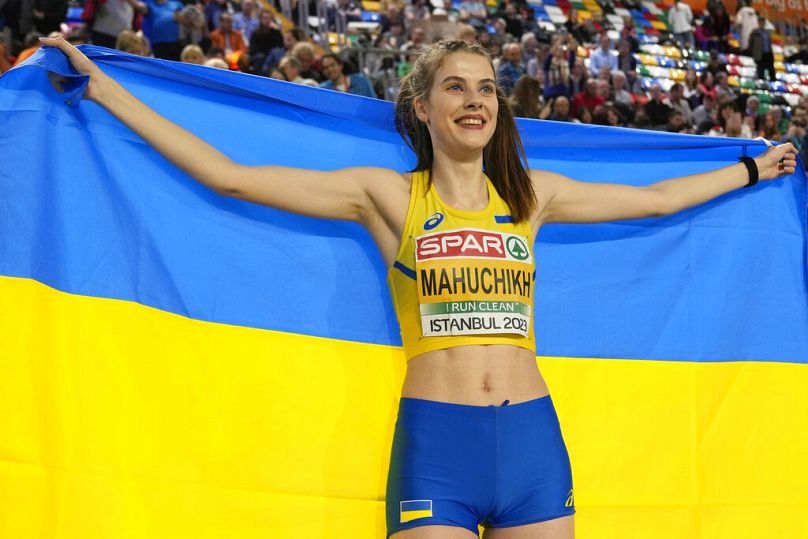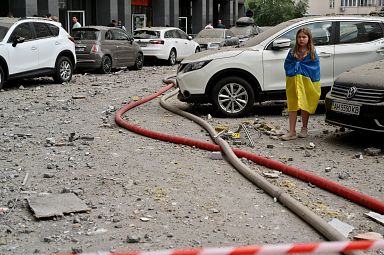All the latest developments from the war in Ukraine.
Prigozhin and Lukashenko could be 'disloyal' to each other
Wagner group leader Yevgeny Prigozhin and Belarusian President Alexander Lukashenko are not allies, exiled Belarusian opposition leader Svetlana Tikhanovskaya told AFP.
"At any moment, Lukashenko can betray Prigozhin or Prigozhin can betray Lukashenko. They are not allies. They cannot trust each other," she said on Wednesday.
The head of the Wagner group travelled to Belarus on Tuesday as part of an agreement negotiated to put an end to his rebellion in Russia.
But Tikhanovskaya believes that much remains unclear about the alleged deal.
Lukashenko's decision to help President Putin was an act of personal convenience to save his own regime, she added.
"He did not act to save Putin's face, nor to save Prigozhin, nor to prevent civil war breaking out in Russia," she maintained. "He only cared about his personal survival, because Lukashenko knows that if the factions in Russia clash, he will pay the price."
"If Prigozhin and Wagner's fighters were to flock to Belarus in large numbers, it could threaten Europe," she said.
"This presence could pose a threat to Ukraine and our Western neighbours", added the opposition leader, whose husband is imprisoned in Belarus.
She warned that Prigozhin could use Wagner's forces to further suppress any dissent. "He is the person who has brought rapists and murderers to our land," she accused.
Kramatorsk death toll climbs higher
The death toll from Russian strikes that destroyed a restaurant in the Ukrainian town of Kramatorsk rose to twelve on Thursday morning, with around sixty people injured.
In his daily address on Wednesday evening, Ukrainian President Volodymyr Zelenskyy denounced the attack as "terrorist" and announced the arrest of an individual who had "coordinated" the Russian fire.
In Kramatorsk on Thursday morning, where the Russian strikes also hit homes, shops, a post office and other buildings, rescue workers removed another body, according to Ukraine's interior minister, bringing the death toll to twelve.
Figures differ on the number of people injured in the attack, with the interior ministry saying 65 people were wounded, and local emergency services say 60.
Three children are among the twelve dead, and one was injured. Eleven people were rescued.
Ukrainian authorities say Russia fired two S-300 missiles - surface-to-air devices that it also uses for ground strikes - at Kramatorsk, which had a population of 150,000 before the war.
Russia bans critical news outlet
Russian authorities have declared a news outlet critical of the Kremlin an “undesirable” organisation, effectively banning it from operating in Russia as part of a continued crackdown on dissent.
Novaya Gazeta Europe was founded by former journalists of the prominent independent Russian newspaper Novaya Gazeta which was stripped of its media license last year. It operates from outside Russia.
Prosecutor General's office accused the outlet of “creating and disseminating materials to the detriment of the interests” of Russia - namely, “false information about alleged wide-spread violations of the rights and freedoms of citizens in Russia, accusations against our country of unleashing an aggressive war on Ukraine, of committing war crimes against civilian population, and of repressions.”
Labelling the publication “undesirable" outlaws its operation in Russia and exposes its journalists, others working with it and its donors to criminal charges.
In recent years, Russia has methodically targeted people and organizations critical of the Kremlin, branding many as “foreign agents” and declaring some “undesirable” under a 2015 law that made membership in “undesirable” organizations a criminal offence.
Last week, Russian authorities slapped the label on the World Wide Fund for Nature and prominent rights group Agora. Earlier this year, the environmental pressure group Greenpeace was forced to close its Russian division after Moscow declared it to be an undesirable organisation.
Belarusian leader approved forced transfers of Ukrainian children, says opposition
A Belarusian opposition activist says that he has provided the International Criminal Court with materials allegedly detailing President Alexander Lukashenko's involvement in the forcible transfer of Ukrainian children to Belarus, accusations angrily rejected by Minsk.
Lukashenko has been Moscow's closest ally, allowing the Kremlin to use Belarusian territory to send troops and weapons into Ukraine, welcoming a continued Russian military presence in Belarus and the deployment of some of Russia's tactical nuclear weapons there.
The authoritarian leader has also agreed to a “union state” project that has seen Moscow and Minsk tighten their economic, political and defence ties, while so far stopping short of a full merger.
Pavel Latushka, a former Belarusian culture minister, said Tuesday that the materials he has handed over to the ICC indicating that more than 2,100 Ukrainian children from at least 15 Russia-occupied Ukrainian cities have been forcibly taken to Belarus with Lukashenko's approval.
Latushka voiced hope that the materials would prompt the ICC to issue a warrant for Lukashenko’s arrest, as it did with Russian President Vladimir Putin.
The court’s prosecution office on Wednesday didn’t confirm receipt of the materials described by Latushka. It said in a written statement that it is "duty bound to protect the confidentiality of the information received. Therefore, we usually do not comment on such communications.”
In March, the ICC issued warrants for both Putin and his commissioner for children’s rights, Maria Lvova-Belova. Judges in The Hague said they found “reasonable grounds to believe” that the two were responsible for the war crimes of unlawful deportation of children and unlawful transfer of children from occupied areas of Ukraine to Russia. Moscow has angrily rejected the move.
Ukraine athlete wants Russians banned from Paris 2024 Olympics
Ukrainian high jumper Yaroslava Mahuchikh has said since the start of the war that all Russian and Belarusian athletes should be excluded from international events, including the 2024 Paris Olympics.
Speaking on Wednesday a short distance from International Olympic Committee headquarters, Mahuchikh did not understand why opinions changed thereafter it had been pro-exclusion last year.
“Thomas Bach said at the start of the war he supported us and stayed in a strong position,” Mahuchikh, speaking about the IOC president, told The Associated Press ahead of this week's Diamond League meet in Lausanne. “But now it's not changed in the situation in Ukraine. Why did they change?”
The IOC gave different advice this year as qualifying events for the Paris Olympics approached, and Bach criticised Ukraine's government last week for helping to block athletes from competing in events that now allow Russians to take part.
The IOC said Wednesday it invited all track and field athletes competing at the Athletissima to meet to visit its headquarters on Thursday — the day Mahuchikh competes — and talk with Bach.
Olympic sports bodies have been urged since March to allow neutral Russian athletes — those evaluated as not actively supporting the war, nor contracted to military or state security agencies — to compete in international events without their flag, anthem or national colours.
Excluding them on the basis of their passports alone was discrimination, the IOC has said, while also adding that sports, where Russians and Belarusians competed, have not had security incidents. Tennis fans with Russian flags threatened security staff and were removed at the Australian Open in January.
Defending Russian athletes while citing human rights is unacceptable to Mahuchikh, the Olympic bronze medalist from the Tokyo Games behind Russian rival Mariya Lasitskene and Australian jumper Nicola Olyslagers.
“It is very difficult to compete with people who destroyed your country. Really every day the Russians do missile attacks to all territories of Ukraine,” said the 21-year-old native of Dnipro who now lives and trains in Belgium. “I don’t know what (more) we should do because we talk about and showed what they do. But, of course, we have people who support us and who understand the whole situation that happened.












